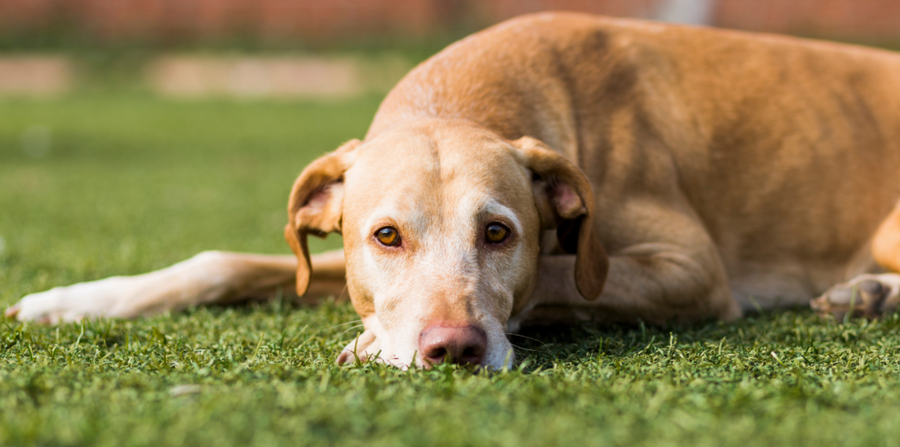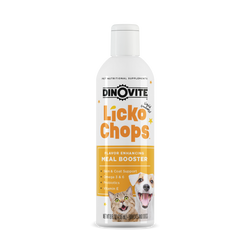Causes of Dog Diarrhea & Upset Stomach

What to Do if Your Dog Has Diarrhea or an Upset Stomach?
Digestive issues like diarrhea and vomiting can be distressing for both dogs and their owners. Whether it's a minor upset stomach or a sign of a more serious condition, knowing how to respond and when to seek help is crucial.
This guide covers common causes, symptoms, and treatment options, including dog probiotics, food supplements, and superfoods that may support digestive health.
.png)
Common Causes of Dog Diarrhea & Upset Stomach
Diarrhea in dogs and other digestive issues can be triggered by a variety of factors. Identifying the cause is essential for proper treatment.
1. Dietary Indiscretion
Dogs have a tendency to eat things they shouldn't—garbage, table scraps, spoiled food, or even foreign objects. This can lead to diarrhea and vomiting.
2. Sudden Diet Change
A rapid switch in a dog’s food can cause digestive upset. Always transition to a new diet gradually over 7–10 days, mixing increasing amounts of the new food with the old.
3. Food Allergies or Sensitivities
Certain ingredients, such as wheat, soy, dairy, or specific proteins, can trigger an allergic reaction or intolerance, resulting in diarrhea or vomiting.
4. Infections
Bacterial, viral, or parasitic infections are common causes of diarrhea in dogs. These include:
- Salmonella
- Parvovirus (a serious viral infection)
- Giardia and other parasites
5. Stress or Anxiety
Changes in routine, loud noises, travel, or exposure to new environments can trigger digestive issues in sensitive dogs.
6. Toxins or Poisons
Household cleaners, human medications, certain plants, and some human foods (such as chocolate and grapes) can be toxic to dogs and cause vomiting or diarrhea.
7. Inflammatory Bowel Disease (IBD)
A chronic condition that leads to persistent digestive issues, IBD requires veterinary management.
8. Pancreatitis
Inflammation of the pancreas can result from eating fatty foods and can cause diarrhea, vomiting, and lethargy.
9. Metabolic Diseases
Conditions like liver disease, kidney disease, and diabetes can cause chronic diarrhea and digestive disturbances.
10. Ingestion of Foreign Objects
Dogs that swallow non-food items, such as toys, bones, or fabric, may experience irritation, blockage, or digestive upset.
My Dog Has Diarrhea: What Now?
If your dog has diarrhea, monitor their condition closely. Look for additional symptoms such as:
- Vomiting
- Lethargy
- Loss of appetite
- Blood in stool
- Dehydration (dry gums, excessive panting, sunken eyes)
If diarrhea persists for more than 24 hours or is accompanied by severe symptoms, contact your veterinarian immediately.
Why Does My Dog Have Diarrhea?
Understanding why your dog has diarrhea is essential for effective treatment. Ask yourself:
- Has their diet changed recently?
- Did they eat something unusual?
- Are they stressed or anxious?
- Have they been exposed to a sick dog?
- Are they showing other symptoms of illness?
Determining the cause helps guide the next steps in managing their condition.
%20(3).png)
What Can I Give My Dog for Diarrhea?
If your dog has mild diarrhea and is otherwise acting normal, you can try these home remedies:
- Fasting. A 12- to 24-hour fast (only offering water) can help reset the digestive system.
- Bland Diet. Feed a mixture of: Boiled chicken (unseasoned) and plain white rice; Pumpkin puree (a natural fiber source that helps firm stool); Boiled sweet potatoes.
- Probiotics for Dogs. A dog probiotic powder or supplement like Dinovite for Dogs helps restore healthy gut bacteria.
- Hydration. Ensure your dog drinks plenty of water. If dehydration is a concern, offer electrolyte solutions (ask your vet for guidance).
- Bone Broth. A gentle, nutrient-rich option to help soothe the stomach while keeping your dog hydrated.
If diarrhea worsens or doesn’t improve, consult your vet.
What Can I Give My Dog for an Upset Stomach?
If your dog has an upset stomach without diarrhea, you can try:
- Plain pumpkin unsweetened and unspiced
- Plain yogurt for natural probiotics
- Boiled chicken or eggs with absolutely no additional seasoning
Dog Vomiting: When to Worry
Vomiting can be a mild reaction or a serious issue. Contact your vet if your dog:
- Vomits repeatedly for more than 24 hours
- Shows signs of pain, lethargy, or bloating
- Has blood in their vomit
- Cannot keep water down
- Has diarrhea and vomiting together
These could indicate a serious condition like pancreatitis, poisoning, or an intestinal blockage.
Supporting Long-Term Digestive Health
Prevent future stomach issues by:
- Feeding a balanced, high-quality diet
- Including dog superfoods like blueberries, pumpkin, and fish oil
- Adding food supplements for dogs, such as probiotics and digestive enzymes
- Keeping your dog’s environment free of toxins and harmful foods
- Avoiding sudden diet changes
Final Thoughts
Upset stomach in dogs and diarrhea in dogs are common but manageable. By identifying the cause and using dog probiotics, food supplements, and natural remedies, you can help maintain your dog's digestive health.
However, if symptoms persist or worsen, always seek veterinary care to ensure your furry friend gets the best possible treatment.
*All information on this website is for educational purposes only and is not intended to replace the expert advice of a veterinarian or veterinary practitioner.
Probiotics can help maintain a healthy balance of good bacteria in your dog's gut, promoting proper digestion and absorption of nutrients. Lickochops is a liquid supplement easily added to your dog's food and is packed with probiotics, omega fatty acids, and vitamin E which help support healthy digestion and overall health.
Dinovite for Dogs also supports healthy digestion with prebiotics, probiotics, omega fatty acids and other nutrients. Try Dinovite for FREE!
Related Products

